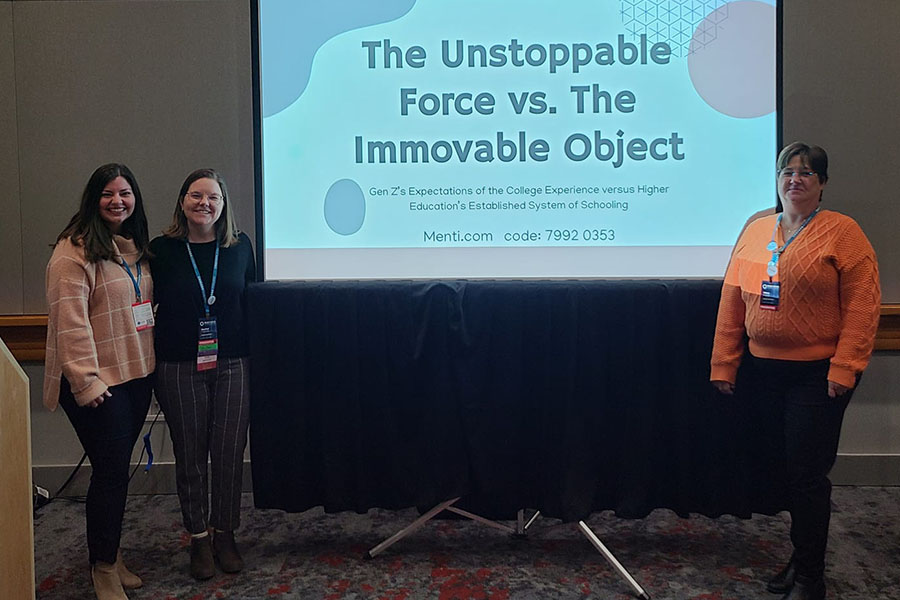CEAT academic advisors present at NACADA Annual Conference
Tuesday, November 8, 2022
Five College of Engineering, Architecture and Technology (CEAT) academic Advisors were invited to present at the NACADA (the Global Community for Academic Advising) Annual Conference in Portland, Oregon earlier this month.
NACADA is an association of professional advisors, counselors, faculty, administrators and students working to enhance the educational development of students.
NACADA evolved from the first National Conference on Academic Advising in 1977 and has over 12,000 members representing all 50 United States, Puerto Rico, Canada and several other international countries. NACADA provides its members with exemplary and innovative opportunities for professional development and personal growth.
CEAT advisors who presented at the conference are Sarah Ayres, Mary Francis, Rachel Todhunter, Kendal Treece and Kristal Junkens, along with Tom Joyce from the College of Education and Human Sciences.
Additionally, several of them are active in NACADA leadership roles. Junkens serves NACADA Region 7 Chair, Francis serves as Awards Chair for Region 7, and Ayres serves as Region 7 2023 Conference Co-Chair.
Following are the titles and abstracts they presented:
Mary Francis and Sarah Ayres
Transforming Success: Creating Positive First Experiences through Orientation
Orientation activities can define a student's long-term impression of the institution
and the advising office. Come learn how we transformed our orientation and enrollment
experience for new incoming freshmen. Small adjustments at the advisor level and college-wide
changes helped take us from a program that was overwhelming and stressful to a positive
experience directed toward student development and relationship building. Working
within the larger university New Student Orientation framework, a complete overhaul
of our college procedures helped us create a new approach that focused on what was
timely, important, and necessary to our incoming students. This session will discuss
how we once conducted orientation, outline the various changes we made and the guiding
principles we used to make those changes, and explore observed outcomes.
Kendall Treece, Rachel Todhunter and Mary Francis
The Unstoppable Force vs. The Immovable Object: Gen Z’s Expectations of the College
Experience Verses Higher Education’s Established System of Schooling
What happens when an unstoppable force meets an immovable object? Conflict. Generation
Z is known as the generation of change, questions, and advocacy. Higher Education
is structured and encourages its students to adapt to the established process. Advisors
have the responsibility of fulfilling the institution's agenda while supporting students
with their problems, ideas, and goals. Advisors have found themselves in a tug-of-war
between these strong-minded entities to facilitate a working relationship. How can
we help these diametrically opposed viewpoints come together to meet their shared
goal of graduating career-ready members of society? We invite you to join us as we
discuss ways to encourage development with both parties and tools advisors can use
to meet the needs of our Gen Z students and our Institutions.
Sarah Ayres
Training, Evaluation and Assessment: Building One Tool to Rule Them All!
Without an effective tool to assess advisement in our college, we embarked on a journey
to build one. Along the way we identified the knowledge, skills, and abilities critical
to advisement tasks in our college. From this information, we were able to build a
tool that will allow us to assess advisement from a student perspective, and use the
same framework for an advisor annual performance evaluation that identifies intersections
with the NACADA Core Competencies. Furthermore, we used these building blocks to create
both a new advisor training program and ongoing training for all advisors on a 12
month rotation. Come learn how we engaged in this process, what we learned, and our
plan for moving forward!
Kristal Soderstrom Junkens and Tom Joyce
Working With and Advising Military Service Members and Veterans
Military Service Members and Veterans bring a wealth of resources with them when they
enroll or work in an Institute of Higher Learning. Many come from diverse backgrounds,
and have multi-cultural and real-world knowledge and experiences that can enhance
classroom discussions for a wide variety of course content. They also may potentially
have vast experience in problem solving and operational planning. Unfortunately, there
may also be some obstacles which can inhibit their ability to fulfill their highest
potential in the civilian world. This discussion will cover the following topics:
Veteran and Military terms and meanings; the reasoning behind why many of these people
serve or served in the US Military; what Veterans, Military Service Members, and Military
Affiliated people bring to their respective campuses; obstacles people within this
community face, including stereotypes and misconceptions; and how Advisors and others
are able to support members of this community.
Left to right: Kendall Treece, Rachel Todhunter and Mary Francis

